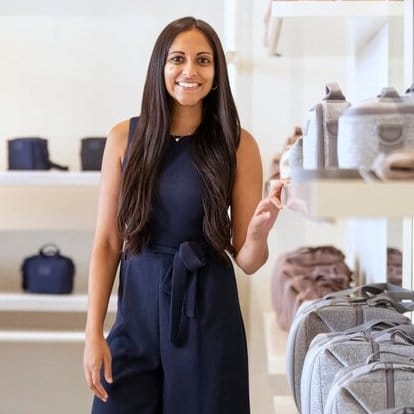
A Conversation with Deepa Gandhi, COO & Co-Founder of Dagne Dover
To celebrate this year’s International Women’s Day, we sat down with Deepa Gandhi to discuss the importance of true equity and representation, the challenges she overcame, as well as her advice for men and women in the workplace today.
Deepa oversees all strategic planning, growth, operations, supply chain and finance for Dagne Dover. Deepa began her career on the trading floor of Lehman Brothers but quickly shifted her career path to the retail industry when she worked at Club Monaco driving double digit growth for the women’s business on their merchandising and planning team. Her analytical rigor combined with her passion for building great brands has made her a key contributor in driving Dagne Dover’s exponential growth since the company’s inception in 2013. She graduated from Johns Hopkins University where she studied International Studies and Entrepreneurship and Management, and she received her MBA from The Wharton School of Business. She is also a 2015 Forbes 30 under 30 and member of Women in America.
Q: How has being a woman influenced your journey with Dagne Dover in terms of your leadership approach or values?
A: Being a woman who is a founder — let alone a career woman — is complex, but I will say that there’s been a massive shift over the course of my career. I started my career on the trading floor at Lehman Brothers, which was, to be frank: the most toxic male environment you could imagine. There were some men on the team who could recognize hard work and would help guide me through the process, but there were others who could not comprehend how a petite Indian woman like myself could be their equal. That made it very hard to build confidence and feel like I was meant to be there.
There were, thankfully, senior women who recognized what I was going through and would try to teach me, as well as help me feel more comfortable. I really appreciated it. From my days at Lehman through where I am today, mentorship has been integral.
Female mentors are the ones who remind you, “You belong here” and “Don’t give in to imposter syndrome.”
Through these experiences, I have come to prioritize mentorship for others as I know how important my mentors have been for me. Additionally, we have built a culture at Dagne that fosters transparency, promoting from within, and respect for all.
Q: What are your favorite examples of how the world is shifting?
A: One of my favorite examples is our board at Dagne Dover. The male board members and investors we have at Dagne are our biggest champions. It’s a breath of fresh air to have men in our corner that recognize and believe in our company, founders, and culture.
I love seeing how much more supportive the world is now and how different industries are. Being female founders, we had to fight to get to where we are. Going to male investors was tough. We were fundraising eight years ago, which was a very different environment. We were always questioned, despite our experience and freshly minted MBAs. I honestly wish we were raising our seed round now, in a world that wants to believe and invest in women.
Q: What is your advice to young women in the workplace?
A: If you’re asked or selected to be in the room, you’re meant to be there. Don’t underplay who you are and the value that you have.
Another thing I always say to young, female entrepreneurs is to confidently go in the direction you want to go. There’s no reason not to. We pitch Dagne very differently now than we did eight years ago. It’s unfortunate that we once believed that we had to prove ourselves or conform before we could position our business the way we wanted to.
Finally, build your personal board of advisors that is comprised of mentors, sponsors and peers that will champion you, honestly support you and give you the feedback that you need at critical junctures.
Q: Is there anything you want to say to other moms out there?
A: You should not feel guilty for being a mom. You should not apologize for it. You should advocate for yourself as a mother. We should normalize being a mom, but also normalize being a parent.
At Dagne, being a parent has been very normalized. Whether it means adapting schedules or having a kid in the background of a Zoom during the pandemic. It’s companies like Dagne and Dwight that can push this message forward and help normalize it.
Q: What does ‘normalizing being a parent’ mean in practice?
A: If someone is on parental leave, and you have to pick up some extra work because they’re on leave that they rightfully deserve, you should not be annoyed by that. You should support that. If you’re a manager or a leader of an organization, have flexibility. I know so many women who have had to leave jobs or have had toxic work experiences because of lack of flexibility before, during or after maternity leave. We should squash that culture, so all employees, even those who are not yet in the parental stage of their lives, are supportive of those who are.
At Dagne, our policy is three months leave along with an additional three month transition period. We recognize that three months isn’t enough. The latter three months allows new parents to figure out the best ways for them to integrate back into work full-time.
Q: We’ve talked about the significant progress that society has made in terms of diversity and inclusion. Where should we focus next as an industry?
A: True equity, or representation, isn’t where it needs to be. We need more representation in the recruiting process so that the right people are getting jobs. If you’re not physically going where underrepresented groups are, those individuals will continue to lack access, and your candidates won’t be representative of the society we live in. At Dagne, we’re figuring out how to access young people from these groups as early as possible so that we can actually break boundaries.

